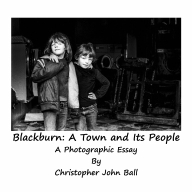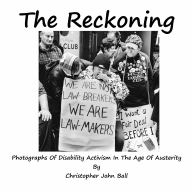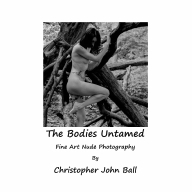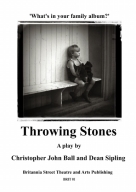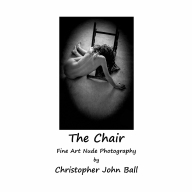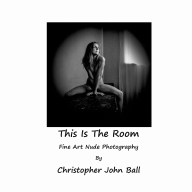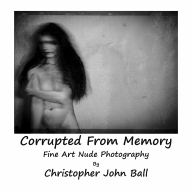
Francesca Woodman - Retrospective - Edited by Isabel Tejeda.
Published by Murcia Cultural. ISBN-13: 978-8496898424

Tweet
Francesca Woodman was born in Denver, Colorado, U.S.A. in 1958. She took an active interest in photography
from a very early age and was only thirteen when her first images were made. Her parents, the photographer George Woodman and ceramicist Elizabeth Abrahams, were both heavily involved within the arts and they encouraged her to attend the Rhode Island School of Design. Here, whilst under the tutelage of Aaron Siskind, she took part in several group exhibitions, as well as having shows in her own right. In 1981 a monograph of her work was published under the title 'Some Disordered Interior Geometries' - the only book of hers to be published during her lifetime. Returning to the United States to complete her studies, after spending time in Europe, Francesca Woodman moved to New York, where she embarked on more ambitious projects, making large blueprints on blue or brown paper, series of images and text, as well as designing and making several handmade books of her own photographs. In 1981, a month after her first book had been published, Woodman, who had been feeling depressed due to a combination of problems with work and a relationship, committed suicide at the age of 22 by jumping out of a window in New York. Promoted by her parents, and posthumously championed by the international gallery scene, Woodman has since achieved something of a cult status, rather like Joy Division's Ian Curtis, having become the subject of novels, fan-fiction, songs and drama. She has been an influence on the likes of Cindy Sherman, Sam Taylor-Wood and Tracey Emin and a source of inspiration to many a fine arts photographer - including this reviewer.
For the most part Woodman’s work consists of images that explore the nature of woman as object. She was familiar with the work of Simone de
Beauvoir; in particular her book 'The Second Sex’ and, by often using herself as her model, she explored similar themes to de Beauvoir of identity and gender. In accepting de Beauvoir’s challenge to women, that they recognise their 'being-for-others' and that, having done so, it was for women themselves to then give this 'being' meaning, Woodman manages to avoid being either overly feminist or political; the work appearing to be much stronger for it. Woodman has employed the very fetishistic objects that have been used to objectify the woman’s body as a mere icon of male desire. These objects include such items as used within 'conventional' soft-porn such as lacy underwear, jewellery and high heels. Woodman, in making the images in the manner that she did, chose to assert, rather than deny or avoid, the fetishistic status of the woman’s body and, in using herself as her own model, Woodman is both the viewer and the viewed.
Much of her work takes the form of a series or narrative, with many photographs being offered in combination with hand written text, either in the form of
narrative or poetic description - reminding one of the photography of Duane Michals. The images are always staged, somewhat theatrical and appear very intense and obsessional. As a model Woodman often hides her face from the camera, either by blurring or by being outside of the frame, and presents her naked body as a symbolic 'everywoman'. Her poses, and that of her other models when she used them, are deliberately chosen to play out the drama, and are not naturalistic, as they concentrate the viewer on the artist's own body and her surroundings. Often, via the use of long and double exposures, the body would be made to merge into the background, becoming one with the room.
Due to her aforementioned cult status many of the books and catalogues of her work, now out of print, fetch prices on the second hand market that put them out of reach of most people. With this in mind the recent publication - by the Espacio AV, in Murcia, Spain (produced in collaboration with the Woodman estate) - of 'Francesca Woodman - Retrospective' is most welcome as it offers an affordable opportunity for existing fans, and those new
to her work, to finally have a substantial collection of Woodman's imagery within their library. This book is based around the retrospective exhibition that was held at the Espacio AV in early 2009. Within the volume's 184 pages are approximately 90 beautifully and sympathetically reproduced examples of Woodman's art along with plenty of informative written material, in both English and Spanish, supplied by Marco Pierini, Rosalind Krauss, Mieke Bal and Fernando Castro. Whilst perusing 'Francesca Woodman - Retrospective' one cannot help but feel a dramatic sense of loss at the artistic potential cut short. Often imitated but seldom equalled Woodman is an artist who has inspired so many and this volume will ensure that she continues to do so for sometime yet. Given the high prices that previous books on Woodman command second hand, I would recommend that this volume be purchased whilst you have the chance - for once out of print it will only become more expensive.
Review by Christopher John Ball
*****Rating
*Review Star Ratings If you have a photography related book you would like reviewing, including self-published material, email details to chris@cjballphotography.co.uk and I will happily consider doing so. The review will be hosted, free of charge, on this website and posted via Twitter and Facebook. All I ask in return is that a link be placed on your own site to the review on this website and, if used in any promotional material, I am credited as Christopher John Ball.

Tweet


